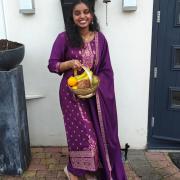
This week, Buckingham Palace announced the engagement of Prince Harry to Meghan Markle – a mixed-race woman with an African-American mother. For reasons beyond my comprehension, this has sparked controversy; whilst the majority of the social media response to the announcement has been positive, there are sadly many people who do not seem so happy about the engagement.
Absurdly enough, some Twitter users have gone as far as to suggest that the engagement infringes upon their rights. Others have stated that the engagement is ‘okay’, to quote one user, so long as Markle and any children she has with the prince identify, racially and culturally, as ‘white’.
The idea was baffling to me – the idea that anyone should be put in a position where failure to reject their culture and ethnic background would result in them being spurned by society. However, I soon came to realise, after this week’s events caused me to evaluate my own experiences, that this is a reality faced by many British youths.
When I am in public, there is often an uncomfortable awareness that passers-by and the people that I interact with are making judgements on who I am as a person, based on my appearance.
For this reason, I feel the need to prove myself to these strangers – prove that I belong in London, prove that I adhere to British culture, and prove my brown skin doesn’t make me a terrorist.
So, I’ll put on forced smiles, articulate as clearly as I can, and be overly-apologetic – as if I’m trying to say, “Hey – look – I’m not what you think. I belong here. I’m brown and we aren’t all terrorists and I belong here.”
Constantly feeling the need to detach myself from racial stereotypes (stereotypes being amplified by the president of the United States himself) is draining. It’s as though I need to act as a representative for all the people who share my skin colour, trying to break down any negative preconceptions about us all, one stranger at a time.
I began to wonder whether other people had shared any similar experiences. So, I asked the question in a group chat containing over 130 girls aged 16 to 17.
The response was astonishing. My phone was suddenly flooded with these young women relaying their experiences with this issue.
“I hate that racial stereotypes restrict me so much,” said one young woman. “I’m too opinionated and suddenly I’m ‘that aggressive black girl’.”
She spoke of how racial branding is hammered into people’s minds – how people of colour face subconscious and immediate judgement from those around them.
“If a white girl wears hooped earrings, it’s fashionable,” she said. “If I wear hooped earrings I’m ‘ghetto’.”
Another girl spoke of her experience at primary school as a member of a minority ethnic group, and how she felt pressure to repress and reject her culture, to cease the mocking of some of those around her.
She said, “I used to want to be seen as a different kind of Indian – not like ‘one of those’; it was a really harmful mentality that had me constantly running from myself.”
Another young woman, who wears a hijab, said that she feels responsible for “putting Muslims in the best light possible,” when she’s in public. “I always make sure to smile more than I naturally do because of some members of the public possibly picking up Islamophobic views from the media. I make sure to tackle the stereotypes.”
But it is distressing that young people feel as though they need to alter their natural behaviour to disconnect themselves from the stereotypes pinned to their race.
Hearing these young women’s stories has made me realise that, under the façade of racial harmony and multicultural acceptance, prejudice still floats around London.
It is not only the whitewashed entertainment industry, or the occasional racist slurs shouted by people driving past in cars, which are causing young people of colour in London to feel apologetic for their race.
It’s every article that states a criminal’s race in the title, as though it played a part in the crime.
It’s every time someone attributes a person’s behaviour to their race.
It’s every thinly veiled stare.
By Noor Mahmood, Woodford County High School


























